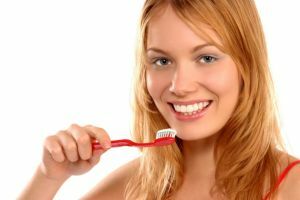 Teeth cleaning is a daily procedure that most people do not have questions. Everyone from the childhood get used to brush their teeth and do not realize that they are doing it wrong.
Teeth cleaning is a daily procedure that most people do not have questions. Everyone from the childhood get used to brush their teeth and do not realize that they are doing it wrong.
Why clean teeth at all? During processing of food in the mouth a favorable environment for the reproduction of bacteria is formed.
Appears plaque, which eventually becomes mineralized and turns into tartar. Bacteria in the process of vital activity secrete enzymes that destroy tooth enamel. Caries forms and there is an unpleasant smell from the mouth.
Regular regular brushing removes plaque, preventing the reproduction of microorganisms that break the microflora of the oral mucosa.
Contents of
- The choice of toothbrush is a question number one
- The choice of toothpaste is a question number two
- Few people brush their teeth correctly
- You asked - answer
The choice of a toothbrush is a question number of times
The toothbrush of medium hardness is usually used, but in some cases the dentistcan recommend a soft or hard brush. The first is needed in case there are problems with the gums. With increased bleeding, brushes with stiff bristles should not be used.
The second is necessary, when there is a tendency to the formation of tartar, which can not be removed with the help of soft bristles. A rigid brush, however, is not too safe. With intensive exposure, it can damage enamel or surrounding tissue.
Recently, electric brushes have become popular, which, according to the manufacturers, make the cleaning procedure 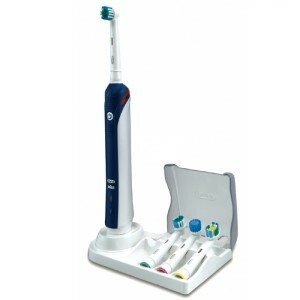 qualitative and easy. Clearly, the purification process with such a device will be more thorough, but dentists do not recommend using an electric brush daily.
qualitative and easy. Clearly, the purification process with such a device will be more thorough, but dentists do not recommend using an electric brush daily.
It is enough to conduct hygiene of the oral cavity with its help twice a week. This is due to the fact that the risk of injury when using an electric toothbrush increases, as does the mechanical effect on the enamel, which may eventually become thinner.
Another thing - an ultrasonic toothbrush. It effectively removes plaque, gently cares for the gums, cleans the cavity of the mouth qualitatively. However, the cost of such devices for home use is high, which does not allow to call this product popular.
If it is a conventional toothbrush for mechanical cleaning of the oral cavity, it is better to give preference to a brush with cross bristles, which will qualitatively remove plaque from the interdental spaces.
It is desirable that the top of the brush has a pad for cleaning the tongue. Thanks to it, you can remove the deposits from the inner surface of the cheeks, the palate and the root of the tongue.
The choice of toothpaste is a matter of number two.
Toothpaste must be selected taking into account the condition of the teeth and gums. In the case where complex oral care is required, the choice should be stopped on a combination toothpaste.
To eliminate odor from the mouth, a toothpaste with a strong menthol flavor is recommended.
- Anti-carious - they contain fluoride and calcium, which improve the state of tooth enamel and strengthen it. It should be borne in mind that these compounds are recommended as a preventive measure of caries. In the presence of carious lesions, use fluorine-containing pastes is not recommended, it can lead to further destruction of the teeth. Fluoride-containing pastes should not be used for oral hygiene in children, although some products are gentle and can be used to clean baby teeth.
- Anti-inflammatory - the main component of anti-inflammatory toothpaste are herbal extracts.
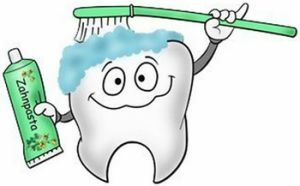 Anti-inflammatory pastes are recommended for use in people who suffer from bleeding gums. These compounds effectively cope with minor mouthwashes, relieve the unpleasant odor and normalize the microflora.
Anti-inflammatory pastes are recommended for use in people who suffer from bleeding gums. These compounds effectively cope with minor mouthwashes, relieve the unpleasant odor and normalize the microflora. - Whitening - they include abrasive particles that effectively remove plaque and coloring pigments, giving the enamel a natural shade. The disadvantage of these formulations is their aggressive effect. It is not recommended to use bleaching pastes for a long time. They can thin the enamel and damage it. Dentists recommend the use of therapeutic whitening pastes, which have a more sparing effect, but are distinguished by a high price.
- Salt - used to prevent and treat gum disease. They contain mineral salts that have a beneficial effect on the microflora of the oral cavity and stimulate metabolic processes in the tissues of the gum.
- For sensitive teeth - have a protective effect. With their help, you can make tooth cleaning more comfortable and delicate. During their use, a thin protective film is formed on the teeth, which reduces sensitivity and reduces perception of aggressive media.
To clean children's teeth, special pastes are recommended that are safe for the child. They do not so effectively clean the oral cavity, how much they teach the baby to hygienic procedure.
Do not have a negative effect in case of ingestion, have a delicate aroma and a pleasant taste.
Few people brush their teeth correctly
Tips that should be adhered to both an adult and a child:
- Dentists emphasize that brush movements during brushing should be vertical .Horizontal movement promotes the accumulation of plaque in the interdental spaces. In addition, regular brushing of teeth in the horizontal direction can lead to the formation of a wedge-shaped defect.
- The amount of the paste should not be too large .Pastas the size of a pea are enough to qualitatively clean the oral cavity.
- The upper teeth of the should be cleaned by "sweeping" movements from the root of the tooth to the cutting surface. The cyst begins with the back teeth, moving towards the forelegs. Each tooth requires 2-4 cleansing movements.
- After cleaning the front surface, should pay attention to the inside of the teeth of the .To remove plaque from the inner surface of the teeth, the brush should be held vertically at an angle of 45 ° C.
- The chewing surface of is cleaned by ironing movements. Similarly, clean the teeth of the lower row. At the end of the procedure, the tongue is cleaned. This can be done with a bristle or the back of the brush if it has a special pad for cleaning the tongue.
- After cleaning, rinse mouth with water. To better remove interdental plaque, you should use dental floss. If necessary, the mouth can be rinsed with a tooth elixir.
- After the procedure , you should thoroughly wash the brush , soap and leave in this form until the next procedure. So you can prevent the multiplication of microbes on the bristles. Change the brush every 3 months.
Two photo instructions on how to clean your teeth:
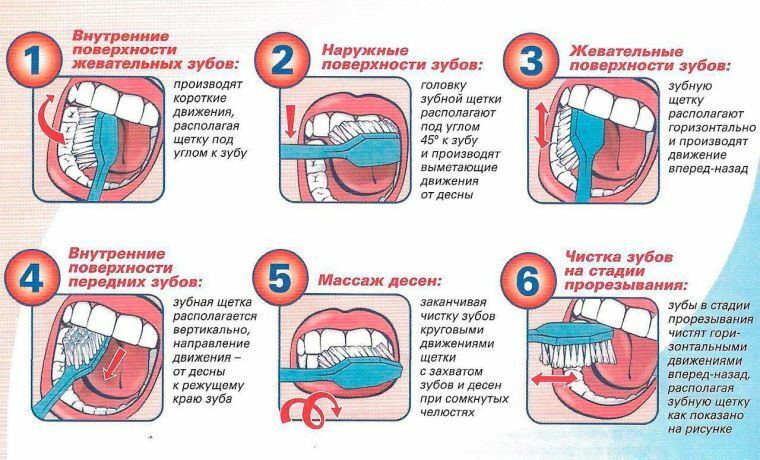
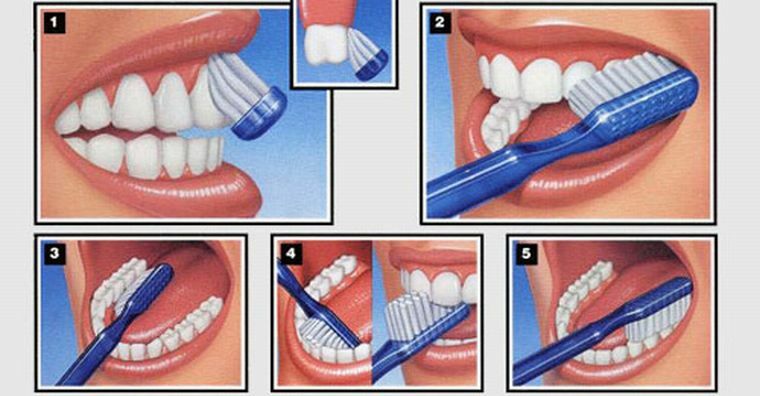
Video useful for kids, as well as their parents: How to properly and why you need to brush your teeth?
You asked - answer
Answers to the most popular questions about the topic:
- Do you need to brush your teeth before breakfast or after it? There is an opinion that you should brush your teeth only after eating. But then, how to be in the morning, when after sleep, mucus and bacteria accumulate in your mouth? Dentists recommend brushing your teeth immediately after waking up. And in order to remove the remnants of food after eating, rinse your mouth with water or a tooth elixir.
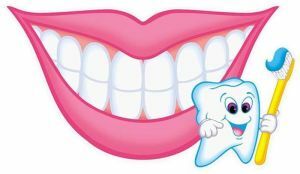
- How many times a day do I clean? There is an opinion that the more often you brush your teeth, the better will be their condition. In fact, this is not so. Dentists recommend carrying out oral hygiene with a brush twice a day. In the rest of the time it is better to use special compositions for mouthwash or to clean the mouth with a salt solution, prepared by yourself at the rate of 1 teaspoon of salt per glass of water.
- How long does it take for good hygiene? Dentists recommend brushing your teeth for 2-3 minutes. Bole short cleaning will not allow to remove plaque, too long - spoil the tooth enamel. Brush your teeth for about 4 minutes. This will teach the baby to the basics of oral hygiene and will teach you how to properly care for your teeth.
